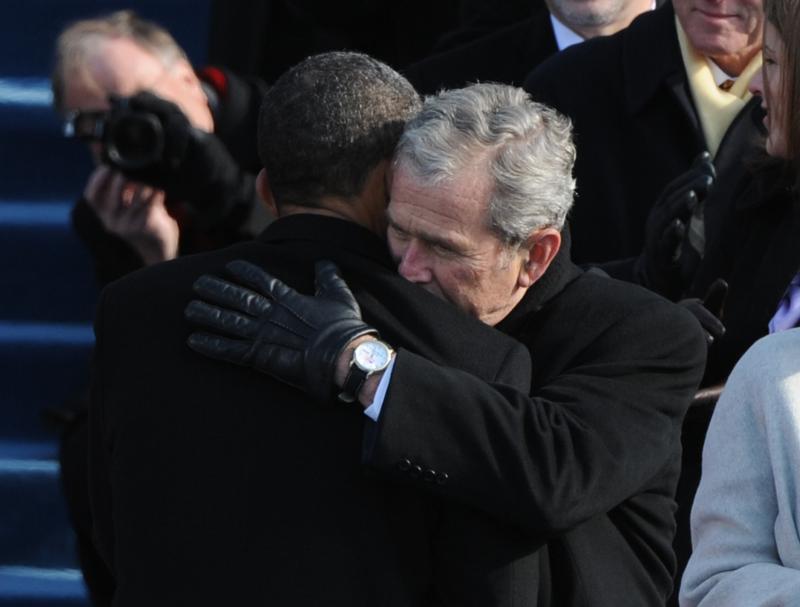
To use a football metaphor, the United States needs an able quarterback in the Oval Office. As three new books out this fall vividly reveal, we have had a punter in that position for some considerable time where fumbling has been a long suit.
George W. Bush’s “Decision Points” lays out in readable English how he confronted a number of the major crises and made decisions on key issues during his two terms.
“Obama’s War” by Bob Woodward is a focused examination of how President Barack Obama and his team agonized over Afghanistan before deciding to send an additional 30,000 combat forces to that conflict.
Richard Wolffe’s “Revival” is an uneven and often superficial effort to psychoanalyze the Obama White House and the clash between the author’s so-called revivalists favoring bold action and “survivalists,” who see politics best served by incremental steps exposing how a campaign mentality metastasizes into a governing philosophy.
What leaps from the pages of these books are three frightening but unintended alarms over the colossal failures and potentially fatal flaws imbedded in our political system.
First, after reading each book, it is shockingly obvious as to how ill-prepared, inexperienced and under-informed new presidents are for the office. Even when so-called Dream Teams, applauded by the pundits in Bush’s earliest days, were gathered, that talent couldn’t compensate for the new president’s lack of experience and understanding as well as ill-preparedness for the job.
Second, and Wolffe makes this case most pointedly, politics no longer are about governing. Politics in the White House are consumed with a campaign mentality in which those who helped their candidate win office are empowered by him to translate the aspirations, promises and, yes, slogans of the campaign into how the nation is run.
Finally, compounding the destructive stranglehold of partisanship in choking off good government, the current organization of the executive branch (and Congress although these books focus on the White House) is incapable of coping with the dangers, challenges and crises of the 21st century.
“Decision Points” is neither a chronological nor comprehensive assessment of the Bush presidency. But it is a fascinating read regardless of whatever opinion the reader holds about Bush 43. The best way to describe this fascination is recalling an iconic skit the famous television satire “Saturday Night Live” produced during the Reagan presidency on the president.
Reagan is in the Oval Office. With staff or others present, he is cast as an affable oaf, bumbling in speech and buffoonish in manner. But when left alone, he transforms into a whirling dervish of activity on the phone with heads of state; giving succinct orders; and making profound statements and judgments across many issues. Then, as soon as his privacy is interrupted, Reagan lapses into his other self.
By the end of his presidency, except to his fiercest critics, Bush had (finally) developed serious experience and understanding of the office and how it should be run. After two mismanaged wars and a financial implosion the worst since the Great Depression, the price of that education was incalculable.
The book mirrors the Reagan skit in portraying a second Bush, unknown to the public. The president writes his book not on the basis of how well or badly he was equipped then in terms of experience and understanding but from his more informed perspective of 2008 and 2009. Hence, the president casts himself as an engaged, competent, knowledgeable and disciplined leader — a picture that most Americans wouldn’t recognize.
In fairness, the president does admit to a number of mistakes and errors particularly regarding the failures in Iraq. However, his recollection is that the mistakes largely came from a failure to communicate with the rest of government as well as the public.
For anyone unfamiliar with Washington and current events, Woodward’s book is a further shock to the system. Despite obvious intellect, Obama and his closest advisers from the campaign are amazingly ill-informed and naive in how government operates. Unsurprisingly perhaps, decisions and actions on Afghanistan are made based on these limiting campaign experiences and not a governing mentality in which government’s resident knowledge base is successively dismissed or ignored.
What can be done about these flaws and realities inherent in our system of politics? Experience, judgment and understanding aren’t specified by the Constitution as presidential qualifications. Further, as campaigning for president becomes a full-time job, the opportunity for preparation is non-existent. And in filling senior White House jobs, loyalty to political advisers given the depths of partisanship is unlikely to be replaced by competence as a selection criterion.
Sadly, the nation is stuck. The title of that book could be “Decision Punts” because, when we need an able quarterback to lead the team, the player who is keeping us in the game turns out to be punter in chief.
Harlan Ullman is Senior Advisor at the Atlantic Council, Chairman of the Killowen Group that advises leaders of government and business, and a frequent advisor to NATO. This article was syndicated by UPI. Photo credit: UPI.
Image: UPI-POY-2009-Inauguration.jpg
